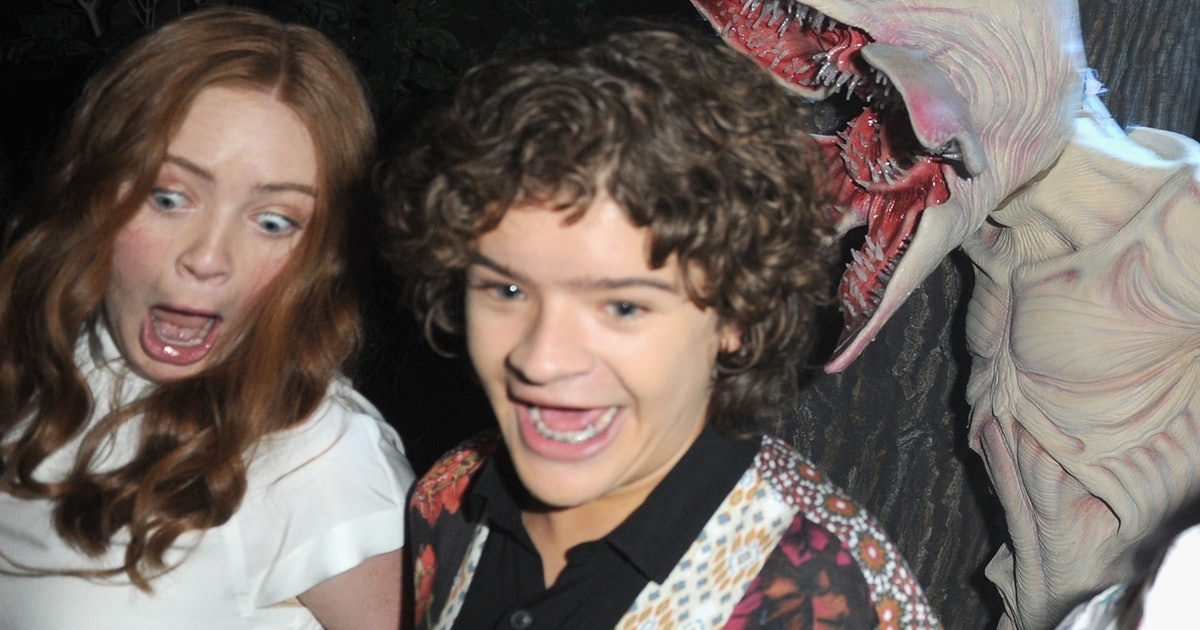Halloween is on the horizon, and my goal is to celebrate the holiday in one way or another every weekend of October. This will likely translate to watching Hocus Pocus one night, reciting Edgar Allan Poes The Raven another, baking Halloween-inspired cookies, and of course, walking through as many haunted attractions as my schedule allows. Whats unfortunate, though, is that most of my friends are terrified of corn mazes in the dark and jump-scare hayrides. IMO, these are some of the best seasonal events, so if you want to know how to get over your fear of haunted houses and the actors who dress up as blood-sucking vampires and zombies so you dont miss out on this spooky good time, the experts are here to tell you how.
My mom always told me that if having babies were really as painful as movies make it out to be, would so many women keep having them? Thats sort of how I feel about haunted houses. If they were really that terrifying and/or dangerous, would so many people rush to preorder their tickets before these attractions even officially open? Think of it this way: Back in October 2013, NBC News reported that the haunted house industry is worth a whopping $300 million dollars, and according to the National Retail Federations annual Halloween survey, roughly 20 percent of the 158 million consumers planning to celebrate All Hallows Eve said they had every intention of attending a haunted attraction that same year. Thats a lot of people choosing to be spooked.

Still, fear is fear, and it doesnt really matter how willing 20 percent of consumers are to get the sh*t scared out of them in the spirit of Halloween. If youre afraid of haunted houses, its honestly understandable, and theres nothing to be ashamed about. But, for those of you looking to overcome your fear of haunted houses so that you, too, can join in on all the fun your friends are having, the first step is to truly understand what it means to be afraid of something, and how your body physiologically responds to emotional fear.
In an exclusive interview with Elite Daily, psychologist Dr. Danielle Forshee, LLC defines fear as an emotional reflection of your body going into fight-or-flight mode the moment your brain perceives a situation as either dangerous or life-threatening. When you experience fear, your brain starts to spit-fire a powerful concoction, Forshee explains, a combination of cortisol (your bodys main stress hormone) and neurotransmitters called catecholamines, a fancy term for a group of chemically-related messengers in our brain that dictate how we feel and what we do, according to the psychologist. From there, she says, your physical brain becomes overwhelmed with stress, which ultimately leads to a lack of control over your impulses, as well as an inability to process information clearly, or make good, logical decisions.
As if that doesn’t describe enough internal chaos, Robert Glatter, M.D., an assistant professor of emergency medicine at Lenox Hill Hospital, Northwell Health, says fear has a very real, and potentially very concerning physical effect on your body, too. Basically, Glatter tells Elite Daily, when youre afraid, your body releases a chemical called norepinephrine, which causes your muscles and heart to contract in response to that fight-or-flight mode. According to Glatter, this can cause you to breathe more rapidly, your heart to pump more blood, your pupils to dilate, and it can even sharpen our vision to escape a physical threat, he says. And because this kind of physiological response is a reaction to what your mind is perceiving as a threat, it doesnt matter if haunted houses are really just a bunch of actors playing dress-up and abiding by a script. If youre emotionally scared, your body will physically respond as if it were a life or death situation.

Up until now, Im sure none of this has been the least bit comforting, but heres where the silver lining comes in: You can overcome your fear of haunted houses; you just have to put your finger on what exactly it is about haunted houses that’s so terrifying to you. Then, you can begin the desensitizing process. Glatter tells Elite Daily that, in many cases, the main reason why someone is afraid of a haunted house is that putting themselves in these types of thriller-esque scenarios ends up triggering deep emotional responses to vivid scenes that include death and dying, evoking primal fears that are ultimately evolutionary-based. In other words, haunted houses are designed to be creepy, and dark, and dangerous in the fantastical sense, which inevitably stirs up an emotional response.
So once youve really taken the time to consider what it is about haunted houses that gives you goosebumps, you have a few options to explore. The first is to face your fear head-on, and accept an invitation to go to a haunted house with a group of friends. In the moment, if someone dressed as a ghost pops out at you and you feel your body tensing up, Glatter suggests focusing on your breathing. Awareness of your heart rate and respiratory rate (breathing), he says, may ultimately help to reduce your fear, and may even cure it if practiced over the longer term. Or, if youre not quite ready to buy your tickets to a spooky attraction just yet, regularly practicing mindfulness through meditation and yoga can re-train your muscles and heart rate to be calmer overall, Glatter explains, no matter what kind of stress youre enduring.
So, if you are curious enough to try working through your fears and venturing into a haunted house this Halloween, I honestly think you’ll love it. However, if haunted houses still aren’t for you, no worries! There are so many ways to celebrate Halloween that are equally as thrilling, without the spook factor.

